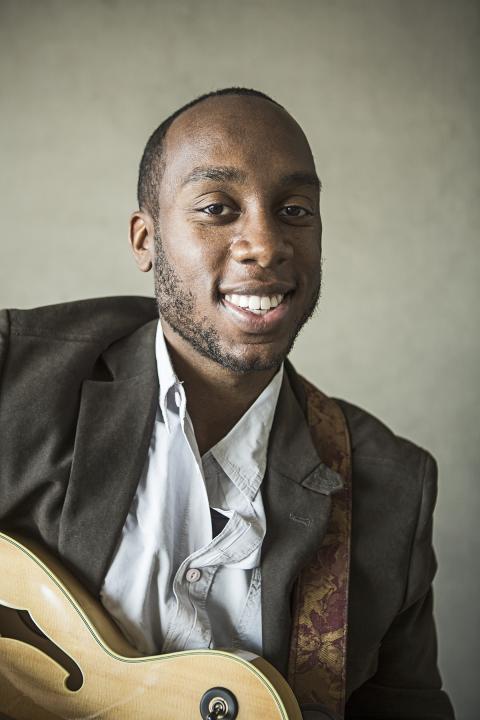Dr. William Junior ’07

Dr. William Junior ’07
Jared Castaldi
Dr. William Junior ’07 has many helping hands along his path to becoming an M.D. specializing in anesthesiology. Some gave him words of advice and encouragement, some shared their time and knowledge, and others offered examples he observed quietly. But make no mistake: Even with great mentoring, it’s only when a mentee has initiative and works hard that he can reach his goals.
The first among many mentors was Junior’s father, a professional jazz guitarist. “I used to go to his rehearsals,” Junior says. “I didn’t want to play guitar when I was a kid, I just wanted to play Super Mario Bros.” But by the time Junior was 15, his perspective changed. “One day I saw his guitar sitting on the stand and thought, ‘I’m going to play that thing.’ It was sort of an epiphany for me.” His father began teaching him and he learned quickly, mastering the melody as well as the solo to George Benson’s hit instrumental “Breezin’”.
After his late but enthusiastic jump into music, Junior wanted to become a member of his high school’s jazz ensemble in Milton, MA. “The director, Alan Cron, decided to give me a shot even though I didn’t have as much experience as the other band members,” Junior says. He also got involved in Berklee City Music under the tutelage of associate professor Winston Maccow. Junior later studied guitar with associate professor John Marasco and played in associate professor Lin Biviano’s band. He ultimately earned a full scholarship to attend Berklee, where he pursued a dual major in music education and music business/management.
It was through his participation in the Berklee City Music Program that Junior ultimately earned a full scholarship to attend Berklee where he undertook a dual major in music education and music business/management.
An adolescent psychology class with professor George Eastman reawakened Junior’s love for the sciences. “I was always interested in science in high school,” he recalls. “I’d had a teacher named Dr. Offner, who, after teaching high school all day, would go to the Whitehead Institute to do research. She was very into her work, and her love and commitment to science was infectious.”
Wandering around a Barnes & Noble Bookstore during his late semesters at Berklee, Junior had what he terms a second epiphany when he picked up Dr. Ben Carson’s book Gifted Hands. “I bought it and read it,” Junior says. “His story had some similarities to mine, and I was inspired by it. I started thinking medicine was how I should focus my interest in science.
“I spoke with [Berklee president] Roger Brown and he told me that I should write to Dr. Carson. Roger’s wife, Linda Mason, had a connection to Dr. Carson through Yale University and was able to get my letter to him. And he actually wrote me back! Getting that letter confirmed to me my belief that I could go into medicine.”
After graduating from Berklee, Junior enrolled in a post-baccalaureate program at the University of Massachusetts, Boston, taking biology, physics, general and organic chemistry, and biochemistry. Members of Junior’s church, also medical doctors, encouraged him—one even tutored him in math, enabling him to bypass some math courses and test into calculus. Junior passed the MCAT and applied to Temple University School of Medicine in Philadelphia. He later learned that his interviewers at Temple saw special qualities in him. His résumé was deeper than those of other applicants. In addition to studying music, Junior taught physics for a time in the Boston public schools as well as writing courses. With his background, he was in. And while medical school offered little time for gigs, Junior occasionally sat in at jam sessions with other musicians in Philly’s clubs.
After graduating as an M.D. from Temple, Junior applied and was accepted to the Yale School of Medicine in the anesthesiology residency-training program. Other mentors shaped his decision to specialize in anesthesiology by offering to let him shadow them in their work at hospitals and private offices.
“There are different cultures in each medical specialty, and I find that the vibe of the anesthesiologist is closest to that of musicians,” he says. “They are smart, kind of relaxed, and know what they’re doing—but don’t need to let everyone know about it. They work all over the hospital, generally with doctors in many different specialties. I like the physiology, the pharmacology, and the moment-to-moment decision making that are part of this field.”
Junior is in his first year of a four-year program at Yale, participating in rotations in surgery and intensive care. For the following three years, all his rotations will be anesthesia related. It’s part and parcel of being a medical resident to work long shifts of 12 to 15 hours a day, and up to 90 hours a week.
Junior can’t yet visualize the type of practice he will establish in the future, but after Yale, he doesn’t foresee additional schooling. “Counting my four years at Berklee, three years at Temple, and this four-year residency—a residency is called graduate medical school—I will have put in 11 years. If I do a fellowship, it could add a couple more years.”
One part of his future is certain though, Junior will seek opportunities to mentor others. He looks back and views the opportunity to play in the high school jazz band as the hand up he needed to start him on a trajectory that led to a full scholarship to Berklee, which led to much more. “When you get the response I’ve gotten from people, it inspires you to pay it forward,” he says. “I’ve been fortunate to have a bunch of amazing people in my life as examples. It makes me want to do things like they did.”




